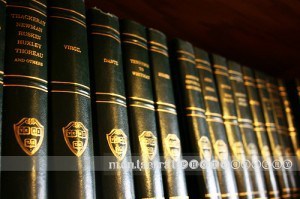Copying this from MormonTimes before it gets lost in their archives.
*****************************************************

The late professor Arthur Henry King was often asked for a reading list of the world’s best books. “Professor King,” a student would no doubt ask him, “what are the books that I should read?”
King prepared such a list for a BYU Honors Program seminar. The class took eight weeks and the students were supposed to read 300 pages a day. “Thoroughly and thoughtfully,” wrote King in a collection of his essays titled “Arm the Children.”
“Actually,” King wrote in typical style, “one should have read everything on the list before coming to the university, but better late than never.”
This is a “good, basic reading list” that King thought could be returned to again and again. On the list are his five favorites: Homer, Virgil, Dante, Shakespeare and Goethe.
“They are the supreme writers,” he wrote. “They reveal the whole of life.”
Arthur Henry King’s “Reading List for a Lifetime”
* The Standard Works (the scriptures)
* Homer, “The Iliad” (translator Richmond A. Lattimore), “The Odyssey” (translator Emile V. Rieu)
* “The Bhagavad-Gita” (The Song of God) (translator Christopher Isherwood)
* Aeschylus, “Aeschylus I — Oresteia” (translator Richmond A. Lattimore)
* Sophocles, “The Oedipus Cycle” (translators Dudley Fitts and Robert Fitzgerald)
* Plato, “Phaedo,” “The Republic”
* Euripides, “Euripides One” (translator Richmond A. Lattimore)
* Herodotus, “The Persian Wars” (translator George Rawlinson)
* Virgil, “The Aeneid” (translator John Dryden or Robert Fitzgerald)
* Livy, “The Early History of Rome”
* Josephus, “The Jewish War”
* Plutarch, “Lives of the Noble Greeks and Romans” and “Lives of the Noble Romans” (editor Edmund Fuller)
* Eusebius, “The Essential Eusebius”
* Augustine, “The City of God”
* Bede, “The Ecclesiastical History of the English People”
* Dante, “The Divine Comedy” (translators John D. Sinclair or Dorothy L. Sayers)
* Geoffrey Chaucer, “The Canterbury Tales” (translator Nevill Coghill)
* Niccole Machiavelli, “The Prince”
* William Shakespeare, “Hamlet,” “Othello,” “Measure for Measure,” “King Lear,” “Macbeth,” “Antony and Cleopatra,” “Coriolanus,” “The Winter’s Tale,” “The Tempest”
* Miguel de Cervantes, “Don Quixote” (translator Walter Starkie)
* Rene Descartes, “Discourse on Method” (translator Wollaston)
* John Milton, “Paradise Lost,” “Paradise Regained,” “Samson Agonistes”
* George Fox, “Journal” (editor Rufus M. Jones)
* John Bunyan, “The Pilgrim’s Progress”
* Jean Baptiste Racine, “Athaliah,” “Phaedra”
* Moliere, “Tartuffe,” “The Would-Be Gentleman,” “The Precious Damsels,” “The Misanthrope” (translators Morris Bishop or Kenneth Muir)
* Jonathan Swift, “Gulliver’s Travels”
* Antoine Prevost, “Manon Lescaut”
* Samuel Richardson, “Pamela” (Part I), “Clarissa”
* Montesquieu, “The Spirit of the Laws” (translator Thomas Nugent)
* Voltaire, “Candide”
* James Boswell, “Life of Samuel Johnson”
* Jean-Jacques Rousseau, “Emile”
* Adam Smith, “The Wealth of Nations”
* Edward Gibbon, “The Decline and Fall of the Roman Empire”
* John Woolman, “Journal”
* Johann Wolfgang von Goethe, “Faust I, II” (translators Walter Kaufmann or Charles E. Passage), “Wilhelm Meister”
* William Wordsworth, “The Prelude” (Books I and II)
* John Jay, Alexander Hamilton and James Madison, “The Federalist Papers” (editor A. Hacker)
* John Keats, “Letters” (editor Robert Gittings)
* Jane Austen, “Persuasion,” “Emma”
* Stendhal, “The Red and the Black”
* Soren Kierkegaard, “Fear and Trembling,” “The Sickness Unto Death” (translator Walter Lowrie)
* Honore de Balzac, “Eugenie Grandet”
* Karl Marx, “Early Writings”
* Henry David Thoreau, “Walden,” “Civil Disobedience”
* Parley P. Pratt, “Autobiography”
* Charles Dickens, “Little Dorrit,” “Great Expectations”
* George Eliot, “Middlemarch,” “Daniel Deronda”
* Gustave Flaubert, “A Sentimental Education” (translator Robert Baldick)
* Fedor Mikhailovich Dostoevsky, “The Brothers Karamazov”
* Leo Tolstoy, “War and Peace” (translator Rosemary Edmonds), “Anna Karenina”
* Sarah Orne Jewett, “Country of the Pointed Firs and Other Stories”
* William James, “The Varieties of Religious Experience”
* Friedrich Wilhelm Nietzsche, “Thus Spake Zarathustra” (translator Walter, Kaufmann)
* Henrik Ibsen, “Peer Gynt” (translator Michael Meyer), “Rosmersholm,” “Ghosts,” “Hedda Gabler”
* Thomas Hardy, “The Mayor of Casterbridge”
* Henry James, “The Ambassadors,” “What Maisie Knew”
* Anton Chekhov, “The Cherry Orchard,” “The Seagull,” “Uncle Vanya,” “The Three Sisters” (translator David Magarshack)
* Joseph Conrad, “Nostromo”
* James Joyce, “A Portrait of the Artist as a Young Man”
* Sigmund Freud, “The Interpretation of Dreams” (translator James Strachey)
* Thomas Mann, “The Magic Mountain,” “Joseph and His Brothers”
* Marcel Proust, “Swann’s Way” (translator C. K. Scott Moncrieff)
* John Maynard Keynes, “The Economic Consequences of the Peace”
* D.H. Lawrence, “Women in Love”
* E.M. Forster, “A Passage to India”
* Franz Kafka, “The Trial”
* Hermann Hesse, “Steppenwolf,” “The Glass Bead Game” (Chapter 7)
* George Santayana, “The Last Puritan”
* Montaigne, “Essays” (translator John Florio)
The list is from the appendix in “Arm the Children: Faith’s Response to a Violent World,” by Arthur Henry King and published by BYU Studies in 1998. King wrote that if he did not indicate a particular translator, the translations are “all equally bad or indifferent, as the case may be.” Or it is in English.
Leave a Reply